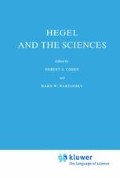Abstract
I shall come shortly to Findlay’s paper.1 First, for reasons that will become apparent later, I want to broaden somewhat the scope of his discussion. It must be remembered that the ‘organic’, before appearing in the Philosophy of Nature as a form of the natural world, is already present in the Logic as one of the determinations of thought;2 and the question I now want to consider is whether, after Hegel’s treatment of it as logical category, it can still have legitimate meaning in the context of the Philosophy of Nature. Speaking briefly and lucidly about Hegel’s Logic always presents, of course, virtually insurmountable difficulties. But I think that I can make my point with reasonable clarity using Kant as a point of reference. His Transcendental Logic had been built on a distinction between the concept of an object in general, such as would be obtained by reflecting upon the requirements of intelligibility that thought makes upon its object, and the concept of an object of experience.3 The two were by no means identical, for an object of experience was ex hypothesi sensible; and although it too, in order to make genuine science possible, would have had to satisfy the general conditions of intelligibility, in its case these also had to be shown to be facts of experience. As long as one proceeded along reflective lines to determine what, in principle, constituted an intelligible object, one had no guarantees that such an object would in fact be realized in experiences, or that these, as Hume had in fact denied, were in fact a fitting subject of science. The big problem that thus faced the critical Kant was precisely to demonstrate that the concept of an object in general (as reflectively determined) was also a valid determination of the immediate objects of experience.
Access this chapter
Tax calculation will be finalised at checkout
Purchases are for personal use only
Preview
Unable to display preview. Download preview PDF.
Editor information
Editors and Affiliations
Rights and permissions
Copyright information
© 1984 D. Reidel Publishing Company
About this chapter
Cite this chapter
Di Giovanni, G. (1984). More Comments on the Place of the Organic in Hegel’s Philosophy of Nature. In: Cohen, R.S., Wartofsky, M.W. (eds) Hegel and the Sciences. Boston Studies in the Philosophy of Science, vol 64. Springer, Dordrecht. https://doi.org/10.1007/978-94-009-6233-0_7
Download citation
DOI: https://doi.org/10.1007/978-94-009-6233-0_7
Publisher Name: Springer, Dordrecht
Print ISBN: 978-94-009-6235-4
Online ISBN: 978-94-009-6233-0
eBook Packages: Springer Book Archive

